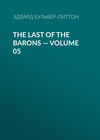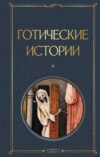Kitobni o'qish: «The Last of the Barons — Volume 05»
BOOK V
CHAPTER I.
RURAL ENGLAND IN THE MIDDLE AGES—NOBLE VISITORS SEEK THE CASTLE OF MIDDLEHAM
Autumn had succeeded to summer, winter to autumn, and the spring of 1468 was green in England, when a gallant cavalcade was seen slowly winding the ascent of a long and gradual hill, towards the decline of day. Different, indeed, from the aspect which that part of the country now presents was the landscape that lay around them, bathed in the smiles of the westering sun. In a valley to the left, a full view of which the steep road commanded (where now roars the din of trade through a thousand factories), lay a long, secluded village. The houses, if so they might be called, were constructed entirely of wood, and that of the more perishable kind,—willow, sallow, elm, and plum- tree. Not one could boast a chimney; but the smoke from the single fire in each, after duly darkening the atmosphere within, sent its surplusage lazily and fitfully through a circular aperture in the roof. In fact, there was long in the provinces a prejudice against chimneys! The smoke was considered good both for house and owner; the first it was supposed to season, and the last to guard "from rheums, catarrhs, and poses." [So worthy Hollinshed, Book II. c. 22.—"Then had we none but reredosses, and our heads did never ache. For as the smoke, in those days, was supposed to be a sufficient hardening for the timber of the house, so it was reputed a far better medicine to keep the goodman and his familie from the quacke, or pose, wherewith as then very few were oft acquainted."] Neither did one of these habitations boast the comfort of a glazed window, the substitute being lattice, or chequer-work,—even in the house of the franklin, which rose statelily above the rest, encompassed with barns and outsheds. And yet greatly should we err did we conceive that these deficiencies were an index to the general condition of the working class. Far better off was the labourer when employed, than now. Wages were enormously high, meat extremely low; [See Hallam: Middle Ages, Chap. xx. Part II. So also Hollinsbed, Book XI., c. 12, comments on the amazement of the Spaniards, in Queen Mary's time, when they saw "what large diet was used in these so homelie cottages," and reports one of the Spaniards to have said, "These English have their houses of sticks and dirt, but they fare commonlie so well as the king!"] and our motherland bountifully maintained her children.
On that greensward, before the village (now foul and reeking with the squalid population whom commerce rears up,—the victims, as the movers, of the modern world) were assembled youth and age; for it was a holiday evening, and the stern Puritan had not yet risen to sour the face of Mirth. Well clad in leathern jerkin, or even broadcloth, the young peasants vied with each other in quoits and wrestling; while the merry laughter of the girls, in their gay-coloured kirtles and ribboned hair, rose oft and cheerily to the ears of the cavalcade. From a gentle eminence beyond the village, and half veiled by trees, on which the first verdure of spring was budding (where now, around the gin-shop, gather the fierce and sickly children of toil and of discontent), rose the venerable walls of a monastery, and the chime of its heavy bell swung far and sweet over the pastoral landscape. To the right of the road (where now stands the sober meeting-house) was one of those small shrines so frequent in Italy, with an image of the Virgin gaudily painted, and before it each cavalier in the procession halted an instant to cross himself and mutter an ave. Beyond, still to the right, extended vast chains of woodland, interspersed with strips of pasture, upon which numerous flocks were grazing, with horses, as yet unbroken to bit and selle, that neighed and snorted as they caught scent of their more civilized brethren pacing up the road.
In front of the cavalcade rode two, evidently of superior rank to the rest,—the one small and slight, with his long hair flowing over his shoulders; and the other, though still young, many years older, and indicating his clerical profession by the absence of all love-locks, compensated by a curled and glossy beard, trimmed with the greatest care. But the dress of the ecclesiastic was as little according to our modern notions of what beseems the Church as can well be conceived: his tunic and surcoat, of a rich amber, contrasted well with the clear darkness of his complexion; his piked shoes, or beakers, as they were called, turned up half-way to the knee; the buckles of his dress were of gold, inlaid with gems; and the housings of his horse, which was of great power, were edged with gold fringe. By the side of his steed walked a tall greyhound, upon which he ever and anon glanced with affection. Behind these rode two gentlemen, whose golden spurs announced knighthood; and then followed a long train of squires and pages, richly clad and accoutred, bearing generally the Nevile badge of the Bull; though interspersed amongst the retinue might be seen the grim Boar's head, which Richard of Gloucester, in right of his duchy, had assumed as his cognizance.
"Nay, sweet prince," said the ecclesiastic, "I pray thee to consider that a greyhound is far more of a gentleman than any other of the canine species. Mark his stately yet delicate length of limb, his sleek coat, his keen eye, his haughty neck."
"These are but the externals, my noble friend. Will the greyhound attack the lion, as our mastiff doth? The true character of the gentleman is to know no fear, and to rush through all danger at the throat of his foe; wherefore I uphold the dignity of the mastiff above all his tribe, though others have a daintier hide and a statelier crest. Enough of such matters, archbishop,—we are nearing Middleham."
"The saints be praised! for I am hungered," observed the archbishop, piously: "but, sooth to say, my cook at the More far excelleth what we can hope to find at the board of my brother. He hath some faults, our Warwick! Hasty and careless, he hath not thought eno' of the blessings he might enjoy, and many a poor abbot hath daintier fare on his humble table."
"Oh, George Nevile! who that heard thee, when thou talkest of hounds and interments, [entremets (side dishes)] would recognize the Lord Chancellor of England,—the most learned dignitary, the most subtle statesman?"
"And oh, Richard Plantagenet!" retorted the archbishop, dropping the mincing and affected tone, which he, in common with the coxcombs of that day, usually assumed, "who that heard thee when thou talkest of humility and devotion, would recognize the sternest heart and the most daring ambition God ever gave to prince?"
Richard started at these words, and his eye shot fire as it met the keen calm glance of the prelate.
"Nay, your Grace wrongs me," he said, gnawing his lip,—"or I should not say wrongs, but flatters; for sternness and ambition are no vices in a Nevile's eyes."
"Fairly answered, royal son," said the archbishop, laughing; "but let us be frank. Thou hast persuaded me to accompany thee to Lord Warwick as a mediator; the provinces in the North are disturbed; the intrigues of Margaret of Anjou are restless; the king reaps what he has sown in the Court of France, and, as Warwick foretold, the emissaries and gold of Louis are ever at work against his throne; the great barons are moody and discontented; and our liege King Edward is at last aware that, if the Earl of Warwick do not return to his councils, the first blast of a hostile trumpet may drive him from his throne. Well, I attend thee: my fortunes are woven with those of York, and my interest and my loyalty go hand in hand. Be equally frank with me. Hast thou, Lord Richard, no interest to serve in this mission save that of the public weal?"
"Thou forgettest that the Lady Isabel is dearly loved by Clarence, and that I would fain see removed all barrier to his nuptial bliss. But yonder rise the towers of Middleham. Beloved walls, which sheltered my childhood! and, by holy Paul, a noble pile, which would resist an army, or hold one."
While thus conversed the prince and the archbishop, the Earl of Warwick, musing and alone, slowly paced the lofty terrace that crested the battlements of his outer fortifications.
In vain had that restless and powerful spirit sought content in retirement. Trained from his childhood to active life, to move mankind to and fro at his beck, this single and sudden interval of repose in the prime of his existence, at the height of his fame, served but to swell the turbulent and dangerous passions to which all vent was forbidden.
The statesman of modern days has at least food for intellect in letters when deprived of action; but with all his talents, and thoroughly cultivated as his mind was in the camp, the council, and the state, the great earl cared for nothing in book-lore except some rude ballad that told of Charlemagne or Rollo. The sports that had pleased the leisure of his earlier youth were tedious and flat to one snatched from so mighty a career. His hound lay idle at his feet, his falcon took holiday on the perch, his jester was banished to the page's table. Behold the repose of this great unlettered spirit! But while his mind was thus debarred from its native sphere, all tended to pamper Lord Warwick's infirmity of pride. The ungrateful Edward might forget him; but the king seemed to stand alone in that oblivion. The mightiest peers, the most renowned knights, gathered to his hall. Middleham,—not Windsor nor Shene nor Westminster nor the Tower— seemed the COURT OF ENGLAND. As the Last of the Barons paced his terrace, far as his eye could reach, his broad domains extended, studded with villages and towns and castles swarming with his retainers. The whole country seemed in mourning for his absence. The name of Warwick was in all men's mouths, and not a group gathered in market-place or hostel but what the minstrel who had some ballad in praise of the stout earl had a rapt and thrilling audience.




















